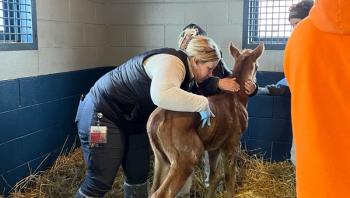
Putting on a happy face
Schaumburg, Ill.- Veterinarians are the most content with their jobs, according to a 2007 member needs assessment survey conducted by the American Veterinary Medical Association.
Schaumburg, Ill. — Veterinarians are among the happiest and most content with their jobs, according to a 2007 Member Needs Assessment survey conducted by the American Veterinary Medical Association (AVMA).
Survey data were compared to existing job-satisfaction data from a study published by the National Opinion Research Center (NORC) at the University of Chicago in 2007, which revealed veterinarians have a high level of job satisfaction at 3.55 out of 4 points, just behind clergy (3.79), teachers (3.61) and psychologists (3.59), but above physicians (3.47) and lawyers (3.33).
The average rating in the NORC study for all jobs was 3.30, which makes veterinarians above average.
"Veterinary medicine is very diversified, so there are many opportunities to find your niche," Dr. Robert A. Dietl, chair of the AVMA Membership Services Committee, says of the findings.
But not all reports on the mental well-being of DVMs are upbeat.
Veterinarians' suicide rate is proportionally four times that of the general population and twice that of other health professionals in the United Kingdom, according to a study titled "Veterinary Surgeons and Suicide: Influences, Opportunities and Research Directions." An article on that study ran on the cover of the May 2008 issue of DVM Newsmagazine.
Job stress, lethal drug access andeuthanasia acceptance were among the potential driving forces behind DVMs' heightened risk, according to the study, which was conducted at the University of Southampton School of Medicine in Hampshire, U.K.
Still, the AVMA survey shows veterinarians overall are happy, particularly food-animal veterinarians (3.69). When compared with the the NORC study results, farm veterinarians ranked third in job satisfaction, just below the clergy and physical therapists, while companion-animal practitioners scored a 3.52 satisfaction rating.
The profession's happiness score of 2.30 out of 3 points was below that of lawyers (2.37) and physicians (2.39). Average happiness for all jobs on the NORC study was 2.23.
AVMA research also shows that very few veterinarians choose to leave the profession. Exit surveys conducted by AVMA, which represents 85 percent of all U.S. veterinarians, show DVMs who leave the profession usually are retiring — 22.6 percent in 2008. The least common reason for leaving (6.1 percent) is that the veterinarian is "no longer employed in a field of veterinary medicine."
Newsletter
From exam room tips to practice management insights, get trusted veterinary news delivered straight to your inbox—subscribe to dvm360.




